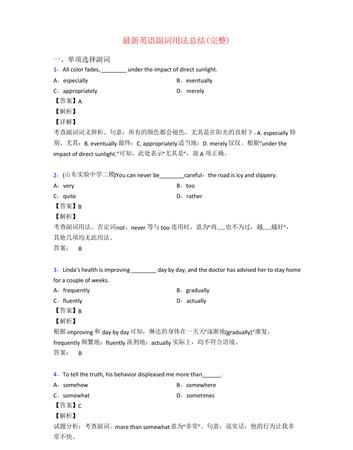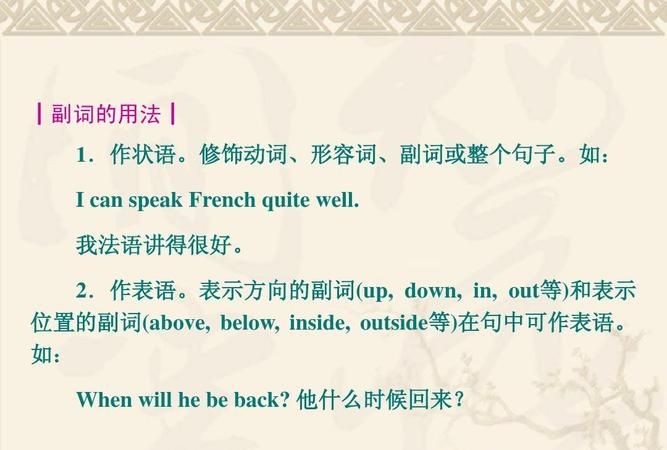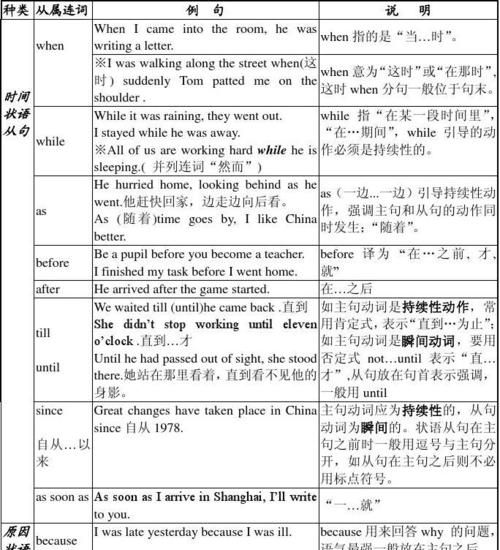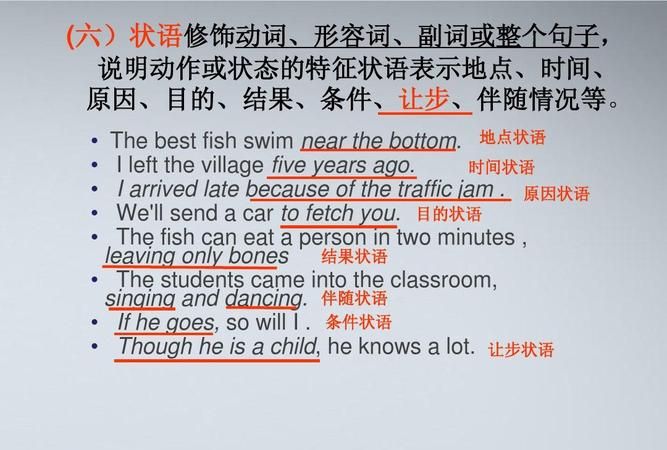本文目录
补语是形容词还是副词
副词作状语修饰的多是谓语动词或整个句子,而补语是对主语或宾语的补充说明.
1.My gift has arrived safely.
副词safely作状语修饰谓语动词arrive.
2.She sat there comfortable.
形容词comfortable作主语She的补语.另有一说是形容词作状语.
3.形容词safe作it的补语.

英语什么是副词?
定 义
副词是一种用来修饰动词,形容词,全句的词,说明时间,地点,程度,方式等概念的词。
分为.地点副词.方式副词.程度副词.疑问副词.连接副词。
副词连用顺序:程度副词+方式副词+地点副词+时间副词。
1) 时间和频度副词:
now,then,often,always,usually,early,today, lately, next,last,already,generally,frequently, seldom,ever,never,yet,soon,too, immediately, hardly,finally,shortly, before, ago,sometimes, yesterday.
2) 地点副词:
here, there, everywhere, anywhere, in, out, inside, outside, above, below, down, back, forward, home, upstairs, downstairs, across, along, round , around, near, off, past, up, away, on.
3) 方式副词:
carefully, properly, anxiously, suddenly, normally, fast, well, calmly, politely, proudly, softly, warmly
4) 程度副词:
much,little, very,rather,so,too,still, quite, perfectly, enough, extremely, entirely,almost, slightly.
5) 疑问副词:
how, when, where, why.
6) 关系副词:
when, where, why.
7) 连接副词:
therefore,moreover,however,otherwise,then. when.where.why(宾语从句中)
副词在句中可作状语,表语,补语。
You speak English quite well. (作状语)
Is she in ? (作表语)
Let him out!(作补语)
1) 多数副词都可以放在动词的后面,如果动词带有宾语,副词就放在宾语后面。
I get up early in the morning everyday.
2) 副词修饰形容词,副词时,副词在前面,而被修饰的词在后面。
It's so important that I must tell my friends.
3) 频度副词可放在实义动词的前面,情态动词和助动词的后面。
I always remember the day when I first came to this school.
You mustn't always help me.
The new students don't always go to dance.
4) 疑问副词,连接副词,关系副词以及修饰整个句子的副词,通常放在句子或从句的前面。
When do you study everyday?
Can you tell me how you did it?
How much does this bike cost?
5) 时间副词和地点副词在一个句中, 地点副词在前面时间副词在后面。
What were you doing in the classroom yesterday afternoon?
The accident took place in the Eleven Avenue one hour ago.
6)否定副词在句首,句子要倒装,如:
Never have I felt so excited!

副词作定语
笔直的身材

副词是状语的一种吗
您好
副词也是状语的一种
但是状语还包括很多
状语的功用:状语说明地点、时间、原因、目的、结果、条件、方向、程度、方式和伴随状况等。
状语一般由副词、介词短语、分词和分词短语、名词、不定式或相当于副词的词或短语来担当。其位置一般放在句末,但也可放在句首或句中。
副词是一种用来修饰动词,形容词,副词或全句的词,说明时间,地点,程度,方式等概念。
1.副词一般在句子中做状语
He speaks English very well. 他英语说得非常好。
其中的“very”是程度副词,用来修饰“well”。“very well”是修饰“speak”的程度状语。
2. 不定式在句子中可以作目的状语
I come specially to see you. 我专门来看你。
3.介词短语
Ten years ago, She began to live in Dalian.
从十年以前开始,她住在了大连。
The boy was praised for his bravery.
这个男孩因为他的勇敢而被夸奖。
4.从句作状语
When she was 12 years old, she began to live in Dalian.
她12岁的那一年开始居住于大连。
If I am not busy tomorrow, I will play football with you.
如果我明天不忙,我就会陪你踢足球。
5.分词作状语
Having had a quarrel with his wife, he left home in a bad temper。
由于和妻子吵了一架,他愤怒的离开了家。
Inhibited in one direction, it now seems that the Mississippi is about to take another.
看样子密西西比河将要改变流向了,因为它的一个方向被阻碍了。
6.名词作状语
We must get together again some day.
将来某天我们必能再相聚.
we should serve people heart and soul.
我们应该全心全意地服务
副词(Adverb)是指在句子中表示行为或状态特征的词,用以修饰动词、形容词、其他副词或全句,表示时间、地点、程度、方式等概念。副词可分为:时间和频率副词、地点副词、方式副词、程度副词、疑问副词、连接副词、关系副词、表顺序的副词、常用于完成时的副词。
时间频率副词
now,then,often,always,usually,next,lastday,already(已经),generally(一般地),frequently(频繁),seldom(很少地),ever,never,yet,soon,too, immediately(立即), finally,shortly(很快), before, ago,sometimes, yesterday. once,twice
地点副词
here, there, everywhere, anywhere,somewhere, in, out, inside, outside, above, below, down, back, forward(向前地), home, upstairs(楼上地), downstairs, across, along, round , around, near, off, past, up, away, on.
方式副词
carefully, properly(适当地), anxiously(焦虑地), suddenly, normally(正常地), fast, well, calmly(冷静地), politely(有礼貌地), proudly(自豪地), softly, warmly ,slowly,badly,hard,bravely
程度副词
much,little, very,rather(相当),so,too,still, quite, perfectly(完美地), enough, extremely(非常), entirely(整个),almost, slightly(细小地), hardly.
疑问副词
how, when, where, why.
关系副词
when, where, why。
连接副词
therefore(因此),moreover(此外),however,otherwise(另外的),then,when ,where,how,why。
表顺序的副词
first,then,next,finally,afterwards,primarily等
完成时的副词
already,ever,just,never,since,yet,recently等
副词在句中可作状语,表语,补语,定语。
He works hard. (作状语)
他工作努力。
You speak English very well. (作状语)
你英语讲地相当好。
Does she stay at home? (作表语)
她呆在家吗?
Let's be out. (作表语)
让我们出去吧。
Food here is hard to get. (here作定语,hard作状语)
这儿很难弄到食物。
Let him out!(作补语)
让他出去!
.修饰名词的副词放在被修饰词之后
a. The villagers there are busy getting in wheat.

以上就是关于副词作状语例句英语 ,补语是形容词还是副词的全部内容,以及副词作状语例句英语 的相关内容,希望能够帮到您。

